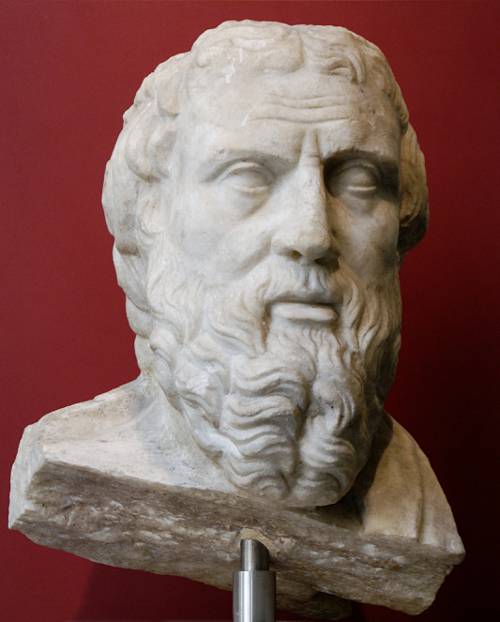
FAQ About Herodotus

Who was Herodotus?
Herodotus was an ancient Greek historian who lived in the 5th century BCE. He is best known for writing 'The Histories,' a detailed record of the Greco-Persian Wars and various other historical events and cultures of his time. He is often referred to as the 'Father of History' due to his systematic approach to gathering and documenting historical information.

Why is Herodotus called the 'Father of History'?
Herodotus is called the 'Father of History' because he was among the first to collect historical data systematically, verify it through inquiry, and write it down in a narrative form. His work laid the foundation for the field of history as a discipline, moving beyond mere storytelling to a methodical exploration of past events.

What is 'The Histories' by Herodotus?
'The Histories' is a work by Herodotus that is considered one of the earliest examples of historical writing. It spans nine books and covers the Greco-Persian Wars, as well as other topics such as geography, cultures, and politics of his known world. Herodotus's narratives provide valuable insights into the customs and life of various ancient civilizations.

When did Herodotus live?
Herodotus was born around 484 BCE and died around 425 BCE. He lived during a period in Greek history marked by significant conflict, including the Greco-Persian Wars, which he extensively documented in his writings.

What are some criticisms of Herodotus's work?
Herodotus has been criticized for including what some consider unreliable stories or exaggerations in his accounts. While his narratives are engaging, they sometimes lack strict historical accuracy by modern standards. Additionally, critics have called attention to his occasional biases and the inclusion of folklore and anecdotal evidence alongside factual history.

How did Herodotus gather information for his writings?
Herodotus collected information through extensive travel and inquiry. He visited various places, talked to locals, and gathered oral testimonies and accounts of events. His method was pioneering for his time, as it involved direct observation and inquiry rather than relying solely on hearsay.

What regions did Herodotus write about in 'The Histories'?
Herodotus wrote about a wide range of regions, including Greece, Egypt, Persia, and parts of Asia Minor. His work covers diverse cultures and geographic areas, reflecting the interconnected nature of the ancient world and providing insights into the customs, politics, and conflicts of these regions.

How has Herodotus influenced modern history writing?
Herodotus's work has significantly influenced modern history writing by establishing methodologies for collecting and analyzing historical data. His inclusion of cultural, geographic, and political contexts set a standard for comprehensive historical documentation. Many techniques used in modern historiography can trace their roots back to Herodotus's methods.

Is 'The Histories' considered a reliable historical source?
'The Histories' is considered foundational in historical writing, but not always reliable by modern standards. Scholars value it for its narrative quality and historical insight, but they also analyze it critically, aware of Herodotus's potential biases and the mix of factual accounts with anecdotal and mythical elements.

What significant events are detailed in 'The Histories'?
'The Histories' primarily focuses on the Greco-Person Wars, covering events such as the Battle of Marathon, the Battle of Thermopylae, and the Battle of Salamis. Additionally, Herodotus includes detailed accounts of the social and political structures of the Persian Empire and various other cultures of the time.

How did Herodotus's background influence his work?
Herodotus was born in Halicarnassus, which was a culturally diverse city in Asia Minor under Persian rule. This multicultural environment likely influenced his interest in different cultures and his comprehensive approach to documenting them. His background provided him with a broad perspective, evident in his accounts of various peoples and their histories.

Did Herodotus only write about wars?
No, while Herodotus is famous for his accounts of the Greco-Person Wars, his writings also include detailed descriptions of the customs, geography, and politics of different regions. His work offers insights into the everyday lives and beliefs of diverse cultures beyond the battlefield.

Where can one find translations of Herodotus's work?
Translations of Herodotus's work, 'The Histories,' can be found in numerous editions worldwide. Many universities carry these translations in their libraries, and they are also available for purchase from bookstores and online retailers such as Amazon. Digital versions are accessible through platforms like Project Gutenberg.

Did Herodotus invent historical writing?
While Herodotus did not invent historical writing, he is credited with advancing it significantly by introducing a systematic and investigative approach. Previous historical records existed, but Herodotus's work transformed the practice into a narrative art form that considered multiple perspectives and cultural contexts.

How did Herodotus's work survive through the centuries?
Herodotus's works were copied and preserved by scholars during ancient and medieval times. They were valued as important documents of history and culture, leading to their careful transcription and transmission. During the Renaissance, there was renewed interest in classical texts, further ensuring their survival and dissemination.

What languages are Herodotus's works available in today?
Herodotus's original work was written in Ancient Greek, but it has since been translated into many languages, including English, French, German, Italian, Spanish, and more. These translations make his writings accessible to a broader audience and continue to be studied by historians and enthusiasts worldwide.

What are some notable quotes from Herodotus's 'The Histories'?
Some notable quotes from Herodotus include observations on human nature and the interconnectedness of cultures. One famous quote is, "In peace, sons bury fathers, but in war, fathers bury sons," which reflects the tragic consequences of conflict. His quotes often carry universal themes about life and history.

What methodology did Herodotus use in his research?
Herodotus employed a methodology that combined travel, observation, and inquiry. He gathered first-hand accounts wherever possible, sought out various sources, and often visited the places mentioned in his narratives. This approach allowed him to create detailed and engaging accounts, though not without criticism for occasional inaccuracies.

How did Herodotus view the concept of history?
Herodotus viewed history as a way to preserve the memory of past events and impart moral and cultural lessons. He believed that by recording the deeds and customs of different peoples, future generations could learn and understand the complexities of human experience, shaping his work into both a historical and educational narrative.

What other historians were influenced by Herodotus?
Many subsequent historians have been influenced by Herodotus, including Thucydides, who followed a more analytical approach, and later historians like Plutarch and Polybius. His influence can be seen across historiography, where his narrative style and comprehensive ethnographic detail set standards for future generations.
